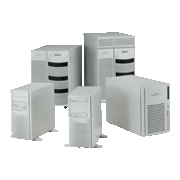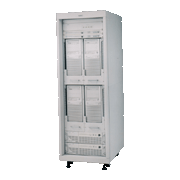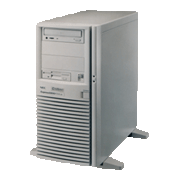In July 1998, NEC rolled out eight models in the Express 5800 series, including two inexpensive entry-level models as well as the Express 5800/180Ha, which could be fitted with up to eight Intel Pentium II Xeon processors. NEC also launched high-availability systems and CTI servers designed for continuous operation for the construction of mission-critical systems. With the addition of these new products, the Express 5800 series lineup covered the full gamut of business, from SOHO to enterprises, and all models were equipped with either Pentium II Xeon processors or Pentium II processors. The Express 5800/180Ha, which contained a proprietary chipset developed by NEC to handle eight CPUs and was scalable to eight Pentium II Xeon processors, was well suited to core business systems and other applications requiring large amounts of CPU processing power. On the other hand, the Express 5800/110Ea, an inexpensive entry-level model that still offered premium operability and reliability, was aimed at small businesses as an affordable and simple solution as a groupware server or business operations server.
NEC marketed a high-availability system developed by Marathon Technologies in the U.S. as the Express 5800/Endurance system. By dividing and isolating the CPU and memory processing structures from the hard disk and network I/O structures in Express 5800 series models running Microsoft Windows NT Server and adding redundancy to each structure, the Endurance system could continue to operate without interrupting processing when hardware faults occurred.
NEC also sold the CTI NAVI, an all-in-one CTI server designed for systems that provided product information or booking conditions by voice or fax. The server was standard equipped with a voice/fax processor board, which could handle four telephone lines, and with VoiceOperator, a software package for constructing systems with sampled voice messages and sample processing.




